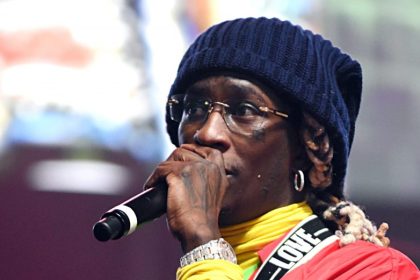The fall of 1995 was an exciting time for me as a hip-hop fan. Bone Thugs-N-Harmony’s E 1999: Eternal had been a major force on the charts and in car stereos since the late summer. Legendary emcee KRS-One dropped what would ultimately be his last bonafide classic with his self-titled sophomore album. Memphis mainstays Eightball and MJG got their first taste of mainstream recognition for their glossy pimp tales with On Top of the World. And on the heels of Wu-Tang Clan’s Ol’ Dirty Bastard’s Return To the 36 Chambers and lyricist Raekwon releasing his acclaimed solo debut, Only Built 4 Cuban Linx, another Wu wordsmith — the GZA — was dropping his own soon-to-be-classic album, the dark and foreboding Liquid Swords. I even bought Livin’ Proof by Gang Starr proteges Group Home. I still say it has some of DJ Premier’s best production work–despite the lackluster rhymes of Lil Dap and Malachi.
But no hip-hop album represents late 1995 more for me than the debut album from a quartet of spiritual sinners from SWATS that merged sociopolitical commentary with down-home folksiness and dope boy realness. That group was Goodie Mob, and that album was Soul Food. I’d loved KRS since I first delved into hip-hop in the late ’80s, couldn’t escape Eightball and MJG and was a Wu-Tang obsessive; but I’m from Georgia, and nothing meant more to me in the mid-90s than the rise of Atlanta rap stars. Goodie Mob was the next Dungeon Family affiliate to take the big leap following OutKast’s 1994 breakthrough with southernplayalisticadillacmuzik, and after that triumphant debut from Andre and Big Boi, Soul Food was the chance to prove that OutKast’s success was no fluke.
But it would ultimately prove much more than just that.
Khujo, T-Mo, Big Gipp and Cee-Lo were four unique personalities fused together by circumstances. Originally, T-Mo and Khujo had been a duo known as Lumberjacks and appeared on southernplayalistic…, on the track “D.E.E.P.” Cee-Lo and Gipp were childhood friends with OutKast and guested on another track on that album, the cautionary “Git Up, Git Out” — a song that was based on an original hook by Cee-Lo. But as a quartet, the foursome was able to combine everyone’s unique personas: Gipp’s “mutant” mentality, Khujo’s righteous rage, T-Mo’s dope-boy relatability and Cee-Lo’s infectious charisma. It all was showcased masterfully on their debut album.
If OutKast were the cool cousins you’d hung out with in high school, Goodie Mob was like college “super seniors,” passing blunts while dropping knowledge in university housing. In 1995, OutKast was still known mainly for thoughtful-but-pimptastic rhymes delivered by two barely-out-of-their-teens rappers in Kangols and Braves gear. Goodie was something else: a heady mix of spirituality, cerebral introspection, Black mysticism and topical commentary. They could be jarringly gritty and real — as when Khujo rapped candidly about herpes on “Fighting” — while still presenting the group as a collective with a distinctly pro-Black ideology — as Cee-Lo indicates with his spoken word verse at the end of the very same track.
Sociopolitical rap had been highly visible since the late 1980s, but with Goodie Mob there came a fresh, southern perspective. As has been stated repeatedly, the hip-hop landscape of the mid-1990s was only just beginning to truly pay national attention to southern rappers, and while no one could ever say Scarface or UGK weren’t offering commentary, it hadn’t been done so explicitly by a southern act with Goodie Mob’s visibility and street cred. Goodie embraced southernness as much as OutKast; opening the album with Cee-Lo singing “Free,” an intro that sounded like a Negro spiritual beamed into the late 20th century; and filling the album with references to whuppins, road-blocks on the Lovejoy exit, fried fish and grits and the Omni.
Soul Food also represents that period in Atlanta’s history just before the cultural and aesthetic shift that defined the city after the 1996 Olympics. In the fall of 1995, the changes were beginning; with Centennial Olympic Park construction underway and the city “cleaning up” the streets a year removed from having been named the most violent city in America by the crime researchers at The Morgan Quitno Press. Soul Food stands as a semi-epitaph for that period. This was Techwood and Bankhead. This was Stewart Ave, Club 112 and the Yin Yang. Fulton County Stadium. This was Atlanta.
Looking back 20 years now, Soul Food hasn’t lost an ounce of resonance. There is some unpacking to do; as with many classic hip-hop albums, homophobia and misogyny aren’t shied away from, and mainstream fans of post-2006 Cee-Lo Green may be shocked at how outspoken the cuddly guy from The Voice used to be back when he rocked a gold grill and rapped about growing up “right around the corner from Benjamin Mays” high school. But this is soul music in the truest sense; a combination of 90s hip-hop, the grit of Otis Redding and the gospel of James Cleveland. And it’s all so fully realized.
And in that, Goodie Mob may have released the most well-developed debut album in the history of Southern hip-hop.
OutKast’s southernplayalistic … is undeniably a classic and the most important southern classic of that era, but doesn’t have Soul Food’s cohesiveness or vision. UGK’s Too Hard To Swallow announced them as part of Texas rap’s new wave in 1992 but now it sounds like Bun B and the late Pimp C were still finding their way creatively and not quite in command of their sound. And Eightball and MJG’s Coming Out Hard is a masterwork of Memphis realness, but isn’t anywhere near as sonically ambitious as Soul Food, with its earthy textures and classic soul flourishes. T.I.’s I’m Serious stands as one of the most woefully underrated albums ever made, but it’s not as distinct and unique as Soul Food was at the time of its release. Soul Food doesn’t sound like a group trying to figure it out. It doesn’t sound like a group unafraid of taking risks. It sounds like a group who knows exactly who they are and what they are trying to say. It could be argued that they surpassed it with their moody and mystical follow-up, 1998s Still Standing; but Soul Food still stands as their most definitive statement. It’s the reason Goodie Mob became so beloved by fans of southern hip-hop. And it’s still as powerful as it was for me in 1995, when I watched the then-unknown group perform almost the entire album during a concert at Fort Valley State University. Buzzed from cheap liquor and with my fist in the air as Cee Lo performed his verse from “Fighting,” I was excited for what these guys were about to drop. I realized then that Andre of OutKast had been absolutely prophetic when he’d declared months earlier at the Source Awards that “The South got something to say.”
And we should still listen. Because two decades later, we’re still fighting for our spirit and mind.

















